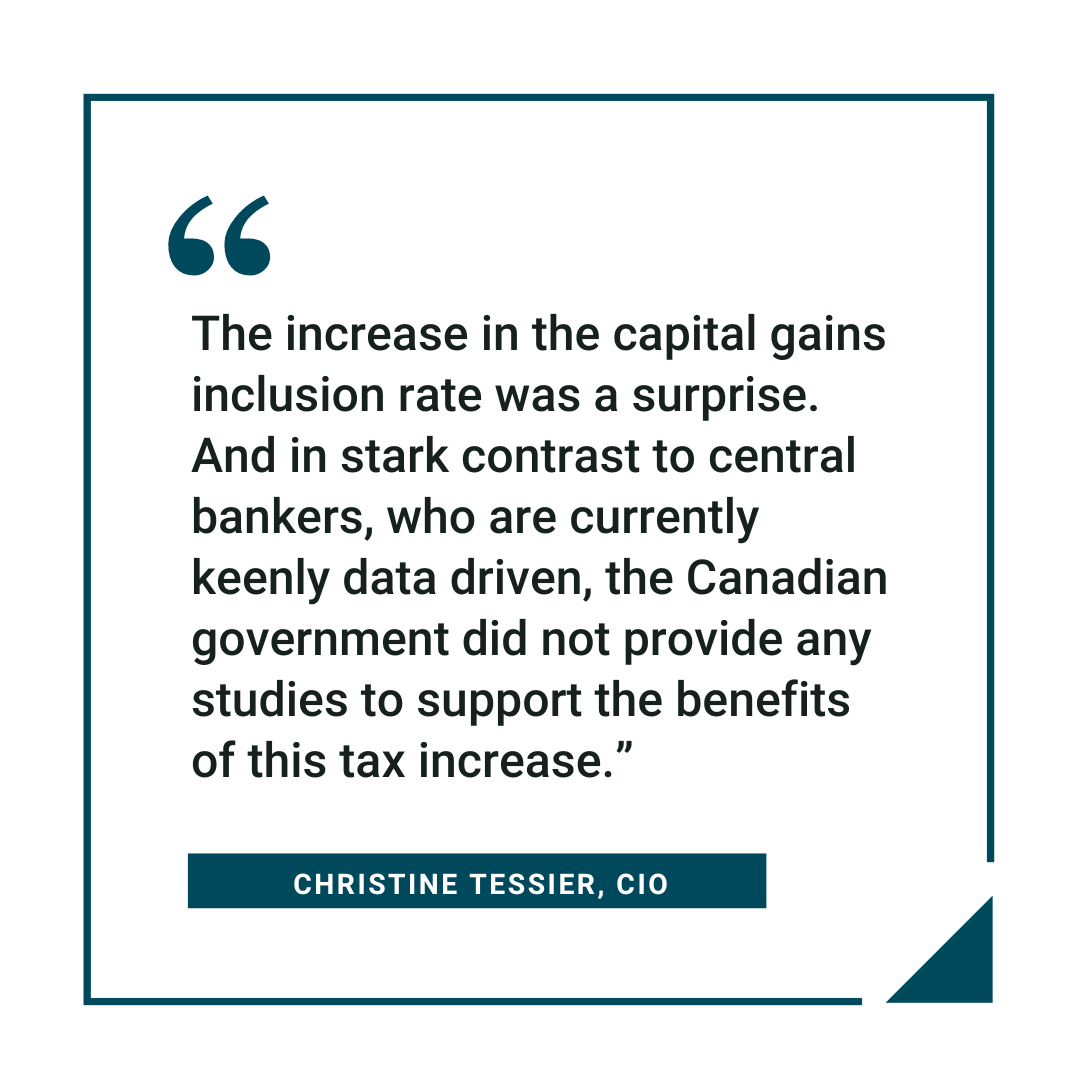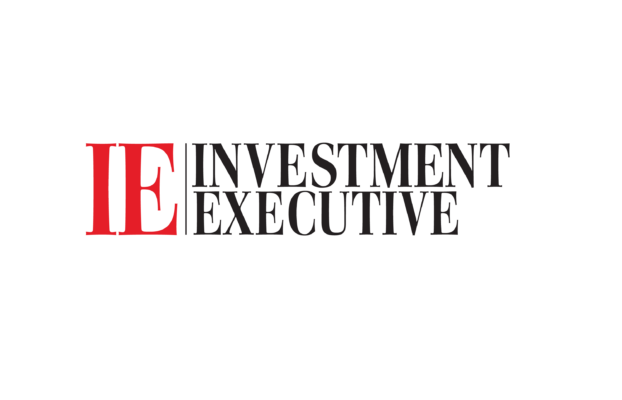Federal Budget 2024: What Canadian investors need to know
On April 16th, the Canadian Federal Government unveiled Budget 2024, surprising the market with a few key announcements. The budget focuses on three overarching pillars: building more affordable homes, making life cost less, and growing the economy in a way that is shared by all. In this summary, we focus on the most notable changes affecting investors today.
- • Increase in the capital gains inclusion rate. Currently, a tax rate of 50% is applied to a taxpayer’s capital gains income, a tax that is commonly referred to as the ‘capital gains inclusion rate’. The current budget proposes to increase this tax rate to 66.67% for corporations and trusts, and to 66.67% on the portfolio of capital gains realized in the year that exceeds $250,000 for individuals. The rate includes capital losses, which can be used to offset gains. The change in tax rate is effective after June 25, 2024.
- • Home Buyer’s Plan: The 2024 Budget proposes to increase the withdrawal limit of the Home Buyers’ Plan from $35,000 to $60,000 from a Registered Retirement Savings Plan for qualifying withdrawals made after April 16, 2024.
- • New working group to motivate greater domestic investment by pension plans. Former Bank of Canada governor Stephen Poloz will lead a working group that will examine rules governing pension plans, with the goal of motivating greater domestic investment.
- • Intention to implement the OECD-agreed Crypto-Asset Reporting Framework. A lesser-reported item to implement the crypto-asset reporting framework in 2026, an initiative believed to help reduce fraud and tax evasion.
- • Various small business and entrepreneurship initiatives, including the lifetime capital gains exemption and the Canadian Entrepreneurs’ incentive.
Office of the CIO Commentary on the 2024 budget
 Overall, we had hoped to see a greater focus on fiscal balance in the Canadian Federal Government’s 2024 budget. Instead, the budget continued the Liberals’ trend of increased program spending. With debt charges set to rise to C$64.3B by 2029, up from $35B in 2023, greater consideration for fiscal balancing would be helpful to ensure current social programs are sustainable and to avoid severe austerity measures in the future. We concur with the Globe and Mail’s characterization of the budget as a move from “borrow and spend” to “tax and spend,” with an estimated tax increase of $21.9B. Further focus on reduced spending is needed.
Overall, we had hoped to see a greater focus on fiscal balance in the Canadian Federal Government’s 2024 budget. Instead, the budget continued the Liberals’ trend of increased program spending. With debt charges set to rise to C$64.3B by 2029, up from $35B in 2023, greater consideration for fiscal balancing would be helpful to ensure current social programs are sustainable and to avoid severe austerity measures in the future. We concur with the Globe and Mail’s characterization of the budget as a move from “borrow and spend” to “tax and spend,” with an estimated tax increase of $21.9B. Further focus on reduced spending is needed.
The increase in the capital gains inclusion rate was a surprise. And in stark contrast to central bankers, who are currently keenly data driven, the Canadian government did not provide any studies to support the benefits of this tax increase. While on the face of it, the Liberals point to this rate change as a way to tax the wealthy to support those in need, we fear that the opposite could occur: the lifeblood of the Canadian economy—its middle class—will continue to suffer further erosion of wealth, leading to a widening wealth gap. In terms of retirement and estate planning, time is now an important asset, given the new annual caps on non-registered capital gains. We expect the new tax will have a significant impact on retiring/retired Canadians, who will have to be more active in managing accumulated capital gains over multi-year periods. Still, there are likely several instances where this new tax will be difficult to avoid during one-time wealth transfer events (inheritance, secondary property sale).
Among the key challenges to the Canadian economy are the need to increase productivity and the importance of attracting capital. Through its new capital gains tax, the budget has created a blunt-force tool affecting all sectors of corporate investment. While select industries received supportive tax credits, a consequence of applying this tax increase to the corporate sector may discourage investment in Canada by major corporations, thus increasing incentives for large Canadian companies to re-domicile abroad. This creates productivity risk for the economy, which will have trouble retaining large employers of choice.
Finally, we view the consumer as being ultimately responsible for growth. Increased taxation of corporations are costs that are likely to flow through to the consumer, given that equity shareholder expectations are not declining. Direct taxation of individuals also reduces disposable income. Both impacts continue to reinforce decreased buying power of the end consumer.
Implications for your portfolio
Regarding equity markets, the increase in capital gains tax reduces the after-tax benefit of this asset class for investors. It may lead to increased year-end tax loss selling. Regarding private markets, it is possible this change in taxation adds further support to the current trend of increasing allocations to private assets. Private market strategies are often provided in vehicle structures constructed for tax efficiency. This change may provide additional (if incremental) interest from investors keen to increase tax efficiency.
The tax is expected to have an impact on the real estate sector, particularly for secondary property purchases and cottage ownership, as well as larger-scale commercial real estate deals (e.g., industrials, warehousing). That said, as related to housing, we believe the mega trends around Canada’s demographics and significant supply/demand imbalances are strong enough to continue to make real estate a viable asset class.
We recommend investors speak with their advisors regarding these changes to examine how the new taxation rate on capital gains will affect their portfolios over the long term.
Disclaimer
I, Christine Tessier, have prepared this commentary to give you my thoughts on various investment alternatives and considerations which may be relevant to your portfolio. This commentary reflects my opinions alone and may not reflect the views of Harbourfront Wealth Management Inc. In expressing these opinions, I bring my best judgment and professional experience from the perspective of someone who surveys a broad range of investments. Therefore, this report should be viewed as a reflection of my informed opinions rather than analyses produced by Harbourfront Wealth Management Inc.




Market and Economic Insights – Q1 2025
10 April 2025